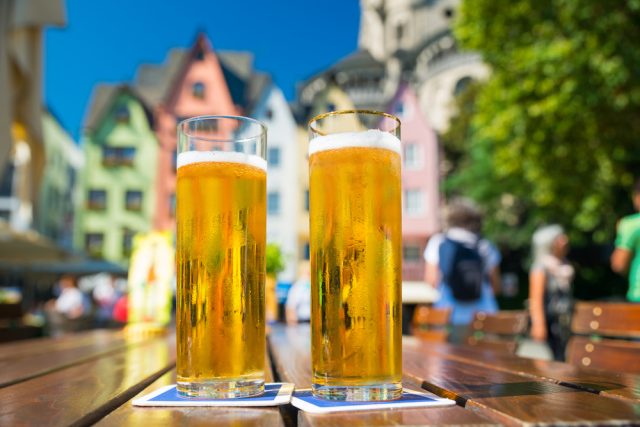England footy fans bemused by Kölsch glasses
England football fans were celebrating their team’s progression to the knock-out stages of the Euros in Cologne last night — but supporters were bemused by “Champagne flute-style” Kölsch beer glasses.

It may not have been a thriller, but with England through to the knock-out stages of the Euro 2024 championships, it was a good opportunity for fans to celebrate with a few glasses of locally brewed cold Kölsch beer.
Kölsch, which is the traditional beer style of the city, is served in 200ml tall glasses. But, according to the Daily Telegraph and Daily Mail, this smaller serve have been criticised by fans for the paucity of liquid.
The tall and thin glasses were described as like “Champagne flutes” and thirsty fans complained about having to get a large number of rounds in to match their drinking habits. One of the reasons for the bemusement could be that fans have been used to pictures of two pint steins in Germany, often showcased during Munich’s Oktoberfest, and had been surprised to learn that different areas of the country have a variety of beer styles and serves.
According to the Imperial system of measurement, the Kölsch glass is similar to a ‘third’ glass — a third of a pint — which is popular in craft beer circles as a method for serving strong stouts, IPAs or DIPAs with high ABVs, where a bar would consider serving a pint to be too large.
A bright yellow ‘Vollbier’ (a ‘normal’ beer with original gravity of 11%–12%), the Kölsch beer style has had since 1997 a protected geographical indication within the EU, and must be made within 31 miles of the city of Cologne.
Partner Content
It is brewed according to the Kölsch Konvention, as defined by the members of the Cologne Brewery Association, Kölner Brauerei-Verband. According to the convention, the style must be warm-fermented with top-fermenting yeast, and conditioned at cold temperatures, like lager.
The brewing process is similar to the style of another local German beer, Düsseldorf’s maltier altbier. As with all traditional German beer styles, it must be brewed according to the Reinheitsgebot — essentially, the beer may only contain water, barley and hops.
Related stories
The beers of the Euro 2024 host cities
Brits to spend £2.4 billion on beer during Euros 2024 tournament
England footy fans denied strong beer
Call for Scots to down steins at Euros to save German beer
Related news
Find out the UK’s most affordable cities for food and drink




